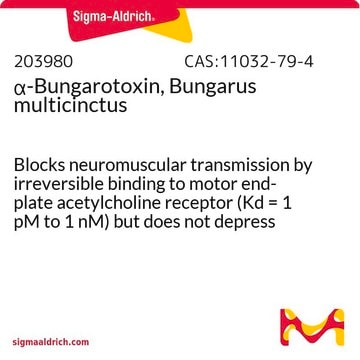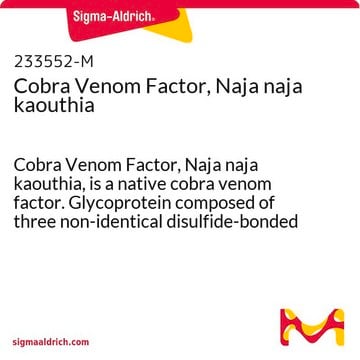T0195
α-Bungarotoxin-tetramethylrhodamine from Bungarus multicinctus (Formosan Banded Krait)
Sinónimos:
TMR-α-BTX
Iniciar sesiónpara Ver la Fijación de precios por contrato y de la organización
About This Item
Productos recomendados
Application
α-Bungarotoxin-tetramethylrhodamine from Bungarus multicinctus was used at a dilution of 1:220 to identify the distribution of nicotinic acetylcholine receptors at neuromuscular junctions of longitudinal sections of rat gastrocnemius muscle.
α-Bungarotoxin-tetramethylrhodamine from Bungarus multicinctus (Formosan Banded Krait) has been used in immunofluorescence staining (1:200) for identification of neuromuscular junction in experimental models. It has also been used to block muscle contraction in myotome cells.
Biochem/physiol Actions
α-Bungarotoxin is a high-affinity antagonist for nicotinic acetylcholine receptors (AChRs) from muscle but not the neurons. Labeling α-Bungarotoxin with tetramethylrhodamine enables the detection of bungarotoxin-binding receptors at neuromuscular junctions.
Useful for detecting the distribution of nicotinic acetylcholine receptors at neuromuscular junctions.
Storage Class
11 - Combustible Solids
wgk_germany
WGK 3
flash_point_f
Not applicable
flash_point_c
Not applicable
ppe
Eyeshields, Gloves, type N95 (US)
Certificados de análisis (COA)
Busque Certificados de análisis (COA) introduciendo el número de lote del producto. Los números de lote se encuentran en la etiqueta del producto después de las palabras «Lot» o «Batch»
¿Ya tiene este producto?
Encuentre la documentación para los productos que ha comprado recientemente en la Biblioteca de documentos.
Los clientes también vieron
Young-Tae Kim et al.
Biomaterials, 29(21), 3117-3127 (2008-05-02)
Peripheral nerve regeneration across long nerve gaps is clinically challenging. Autografts, the standard of therapy, are limited by availability and other complications. Here, using rigorous anatomical and functional measures, we report that aligned polymer fiber-based constructs present topographical cues that
Brian T Feeley et al.
The American journal of sports medicine, 48(11), 2660-2668 (2020-07-31)
The muscle quality of the rotator cuff (RC), measured by atrophy and fatty infiltration (FI), is a key determinant of outcomes in RC injury and repair. The ability to regenerate muscle after repair has been shown to be limited. To
Sara Bachiller et al.
Molecular neurobiology, 55(12), 8856-8868 (2018-04-01)
A missense mutation in HERC1 provokes loss of cerebellar Purkinje cells, tremor, and unstable gait in tambaleante (tbl) mice. Recently, we have shown that before cerebellar degeneration takes place, the tbl mouse suffers from a reduction in the number of
Paul Hendrickse et al.
Experimental gerontology, 106, 159-164 (2018-03-11)
A large part of age-related muscle wasting is due to incomplete reinnervation of fibres that have become denervated following motoneuron loss. Neural cell adhesion molecule (NCAM) and sodium channel NaV1.5 are considered markers for denervation, but the time course of
Anna L Gray et al.
Disease models & mechanisms, 13(5) (2020-03-11)
Spinal and bulbar muscular atrophy (SBMA), also known as Kennedy's Disease, is a late-onset X-linked progressive neuromuscular disease, which predominantly affects males. The pathological hallmarks of the disease are selective loss of spinal and bulbar motor neurons, accompanied by weakness
Nuestro equipo de científicos tiene experiencia en todas las áreas de investigación: Ciencias de la vida, Ciencia de los materiales, Síntesis química, Cromatografía, Analítica y muchas otras.
Póngase en contacto con el Servicio técnico










